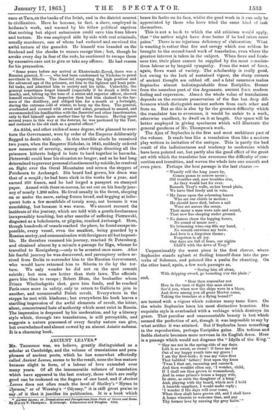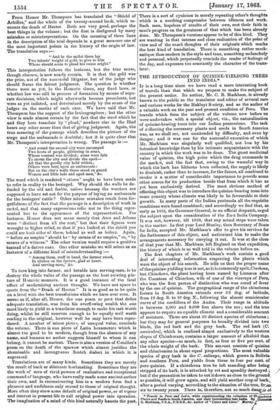ANCIENT LEAVES.*
MR. ToomrsoN was, we believe, greatly distinguished as a scholar at Cambridge, and the volume of translations and para- phrases of ancient poets, which he has somewhat affectedly called Ancient Leaves, seems to be the result, none the less mature because slight in form, of a labour of love extended over many years. Of all the innumerable volumes of translation which have appeared In the last century, those which are really good can be reckoned on the fingers of one band, and if Ancient .Leaves does not often reach the level of Shelley's "Hymn to litrmes," or of Worsley's "Odyssey," it is still great praise to say of it that it justifies its publication. It is a book which • * 4acient Leaves; or, Translations and Paraphrases from Poets of Greece and Rome. By D'A.7 W. Thompso3. E liuburgh. Edmouston and Douglas. 1862.
bears its faults on its face, whilst the good work in it can only be appreciated by those who have tried the same kind of task themselves.
This is not a book to which the old criticism would apply, that "the author might have done better if he had taken more pains." There is no injurious deficiency of elaboration. What is wanting is rather that fire and energy which can seldom be brought to the second-hand work of translation, even where the greatest interest is taken in the subject. When force and fresh- ness tire, their place cannot be supplied by the most conscien- tious labour or by languid sympathy. From the want of force, again, flows want of variety. The scholarship is really good, but owing to the lack of sustained vigour, the sharp corners of ancient thought are rubbed off, and a fatal sameness makes Sophocles almost indistinguishable from Euripides, Homer from the nameless poet of the Argonauts, ancient from modern feeling and expression. Almost the whole value of translations depends on the accurate preservation of the fine but deep dif- ferences which distinguish ancient authors from each other and from us. But as this is also by far the greatest difficulty which the translator has to overcome, it would be unfair to a work, otherwise excellent, to dwell on it at length. Our space will be better employed in giving specimens which will illustrate the general goodness of Mr. Thompson's work.
The Ajax of Sophocles is the first and most ambitious part of the volume. It reads less like a translation than like a modern play written in imitation of the antique. This is partly the bad result of the indistinctness and tendency to modernize which have been pointed out, but partly also the good effect of the great art with which the translator has overcome the difficulty of con- nection and transition, and woven the whole into one smooth and even piece. Perhaps the best passage is the last chorus :—
"Wearily roll the long years by,
Comes pause to sorrow never ; Old troubles end, new troubles rise, As they would last for ever.
Beneath Troy's walls, on her broad plain, We have bled freely and in vain.
"My Curse upon the scheming knave Who set our chiefs in motion ; He should have died, before a sail Were set across the ocean.
Then many a man were safe and sound, That now lies sleeping under ground.
"No dances cheer the lagging hours, No sound of music now ; No brimming wine-cup fills my hand, No wreath entwines my brow.
And love is a forgotten theme ; Forgotten is all joy.
Our days are full of fears, our nights Chill'd with the dews of Troy."
Unquestionably the worst piece is the first chorus, where Sophocles stands aghast at finding himself done into the pro- verbs of Solomon, and pointed like a psalm for chanting. On the other band, again, a few such passages as,
Seeing him all alone, With dripping sword, go bounding o'er the plain ;"
"Dost thou remember not How in the turn of flight this man alone Sav'd you, when now the ships were in a blaze, And down among you all great Hector came, Taking the trenches at a flying bound?"
are turned with a vigour which redeems many tame lines. On the whole Sophocles loses his most distinctive beauties. His exquisite style is overloaded with a verbiage which destroys its grace. That peculiar and unaccountable beauty is lost which seemed the perfection of art, though it was impossible to say by what artifice it was attained. But if Sophocles loses something in the reproduction, perhaps Euripides gains. His tedious and feeble rhetoric becomes more nervous in its English dress. Here is a passage which would not disgrace the "Idylls of the King."
"Slay me not in the spring-tide of my days.
Life is so sweet, so sweet! 0 force me not Out of my happy youth into my grave !
I am thy first-born ; it was my voice first
That babbled father;' first upon thy knee
'Twas I that sat, caressing and caress'd.
And thou wouldst often say, I wonder, child, If I shall see thee grown to womanhood, And in some prince's house a happy wife, In state, as suits the daughter of a king.' And, playing with thy beard, which now I hold A humble suppliant, I would make reply ; wonder if the days will over come, When thou shalt have grown old, and I shall have A home wherein to welcome thee, and pay Thy former love by nursing thy grey hairs.' "
and, From Homer Mr. Thompson has translated the "Shield of Achilles," and the whole of the twenty-second book, which re- sounts the death of Hector. Both are very good, perhaps the best things in the volume ; but the first is disfigured by many mistakes or misinterpretations. On the meaning of three lines in the description of the trial depends in a great measure one of the most important points in the history of the origin of law. The translation says :—
"And in the midst there lay Two talents' weight of gold, to give to him
Whose should seem to plead his cause aright."
This interpretation follows the lexicons, but the true sense, though obscure, is now nearly certain. It is that the gold was the prize, not of the successful litigator, but of the judge who should frame the fairest judgment. The question is whether there were as yet, in the Homeric times, any fixed laws, or whether law was still in process of formation by means of sepa- rate decisions, which might afterwards become precedents, but were as yet isolated, and determined merely by the sense of the judges on the merits of each case. We have said that Mr. Thompson has the support of the lexicographers ; but the other view is made almost certain by the fact that the word which he and they here translate by "plead," nowhere else in the Iliad bears any other sense than that of giving judgment. Again, the true meaning of the passage which describes the picture of' the siege and the ambuscade is doubtful ; but it is quite clear that Mr. Thompson's interpretation is wrong. The passage is :—
" And round the second city were encamped Two hosts of people, glittering in arms, Whose counsel was divided; some were fain To storm the city and divide the spoil— All that the goodly city held within; Others were bent upon an ambuscade : But on the city's walla there stood on guard Women and little lads and aged men," &c.
'The word which is rendered "others" ought to have been made to refer in reality to the besieged. Why should the walls be de- fended by the old and feeble, unless because the warriors are supposed to have set out for the purpose of laying an ambuscade for the besiegers' cattle ? Other minor mistakes result from for- getfulness of the fact that the passage is a description of work in metal, and that many expressions refer not to the thing repre- sented but to the appearance of the representation. For instance, Homer does not mean merely that Ares and Athene were "distinct from el the rest," but that their figures were wrought in higher relief, so that if you looked at the shield you
-could see both sides of them, behind as well as before. Again, 4' before an umpire" should be" by means of an umpire," or, "by means of a witness." The other version would require a genitive
instead of a dative case. One other mistake we will select as an instance of a different kind of misunderstanding :—
" Among them, staff in hand, the farmer stood, In silence on the furrow, glad at heart. And serving-men," &c.
To turn king into farmer, and heralds into serving-men, is to -destroy the whole value of the passage as the best existing pic- ture of Homeric manners. it is a good instance of the fatal -effect of modernizing ancient thought. We have not space to -quote from the "Death of Hector." It is so good as to be quite on a level with the best translations which we have ever seen. It seems as if, after all, Homer, the one poem or poet that defies adequate translation, was from his overflowing wealth the one most likely to yield to a translator enough to make his task worth doing, whilst be still reserves enough to be equally well worth reading in the original, however well he may have been repro- duced. A number of minor pieces, of unequal value, conclude tee volume. There is one piece of Latin hexameters which is
almost too good to be modern, though from the absence of any name, and because no author suggests himself to whom it can belong, it cannot be ancient. There is also a version of Catullus's
poem on the death of the sparrow which almost justifies the abominable and incongruous Scotch dialect in which it is expressed.
Translations are of many kinds. Sometimes they are merely the result of hack or dilettante bookmaking. Sometimes they are
the work of men of vivid powers of realization and exceptional .command of language, who have really made some ancient author their own, and in reconstructing him in a modern form find a pleasure and usefulness only second to those of original thought. More often they show some default of original power, or of vigour and interest in present life to call original power into operation. The imagination of a mind of this kind naturally haunts the past. There is a sort of cynicism in merely repeating other's thoughts which is a soothing compromise between idleness and work. Such men, hopeless of results of their own, rest their faith in man's progress on the greatness of that which has been already done. Mr. Thompson's versions appear to be of this kind. They are wanting in that intense and close realization of the point of view and of the exact thoughts of their originals which marks the best kind of translation. There is something rather mock- antique than modern in the style and tone, something melancholy and personal, which perpetually reminds the reader of feelings of the day, and expresses too constantly the character of the trans- lator.































 Previous page
Previous page